“Battle for Justice” Shines a Light on Joe Biden, from 1987 to Today
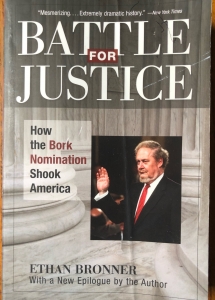 With Joe Biden’s recent inauguration as 46th President of the United States, I’ve recently been re-reading a terrific book that shines light on him as a politician and a person, on his inner character, from a lot of very interesting angles. Battle for Justice: How the Bork Nomination Shook America, was originally a Norton hardcover in ’89, written by then-Boston Globe reporter Ethan Bronner, later a NY Times reporter, and now an editor with Bloomberg News. I had the privilege of republishing the book in trade paperback in 2008 when I was Editorial Director of Union Square Press.
With Joe Biden’s recent inauguration as 46th President of the United States, I’ve recently been re-reading a terrific book that shines light on him as a politician and a person, on his inner character, from a lot of very interesting angles. Battle for Justice: How the Bork Nomination Shook America, was originally a Norton hardcover in ’89, written by then-Boston Globe reporter Ethan Bronner, later a NY Times reporter, and now an editor with Bloomberg News. I had the privilege of republishing the book in trade paperback in 2008 when I was Editorial Director of Union Square Press. 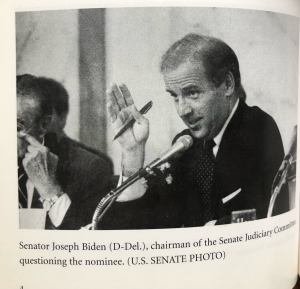
At the time Ronald Reagan nominated Bork in July 1987, Biden was Chair of the Senate Judiciary Committee, and had already declared himself a candidate for the 1988 Democratic presidential nomination. The Reagan administration wanted confirmation hearings to begin immediately, but as Chair of Judiciary, Biden was in control of the calendar, and the hearings didn’t begin them until late September. This was a smart move, because during the interval opposition to Bork began forming ahead of the hearings, which went very badly for the nominee, who was widely perceived to be too far right-wing for many senators. The vote in committee went against Bork 9-5. Many observers thought Bork would at that point withdraw his nomination, but he insisted on having a vote by the full senate, which also went against him decisively, 58-42, with six Republicans voting Nay. Bronner’s narrative of the nomination fight is engrossing, and filled with Senate figures from our recent past—Ted Kennedy, who led the opposition to Bork; Arlen Specter, who was among the Republicans to vote Nay; Paul Simon, the bow-tied Democrat from Illinois; Pat Leahy of Vermont, who just served as Judge of the Trump Impeachment trial; and the odious John Bolton, who working in the Reagan Justice Department, was nominally responsible for shepherding Bork through the process, where his usual lack of charm contributed to the demise of the Bork nomination, though the nominee’s truculent extremism was the primary factor.
As it happened, Biden’s candidacy for the Democratic nomination also went down in the Summer-Fall of 1987, even before the fate of Bork’s nomination was settled in October of that year. In campaign speeches, Biden had borrowed words from the British Labor politician Neil Kinnock, with attribution at the outset. However, on several occasions that August, and once at a Democratic event in Iowa, he borrowed Kinnock’s words and the British pol’s family story, without acknowledging the source. A Biden campaign aide, Pat Caddell, said he was responsible for inserting the phrases into the speech, but the damage was done.
Seeing Biden as president now, and the scandals the country has witnessed since 1987, it is quaint to see what knocked Biden out back then. I am glad that the quirks of history have unfolded in such a way that Joe Biden is our president in 2021. Bronner’s book is well worth reading again now, in light of all we know today. 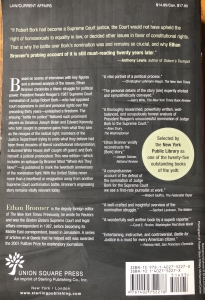
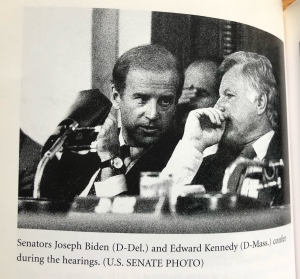

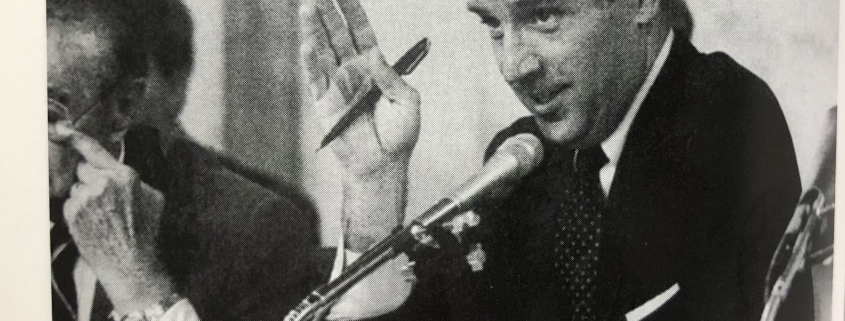


Leave a Reply
Want to join the discussion?Feel free to contribute!